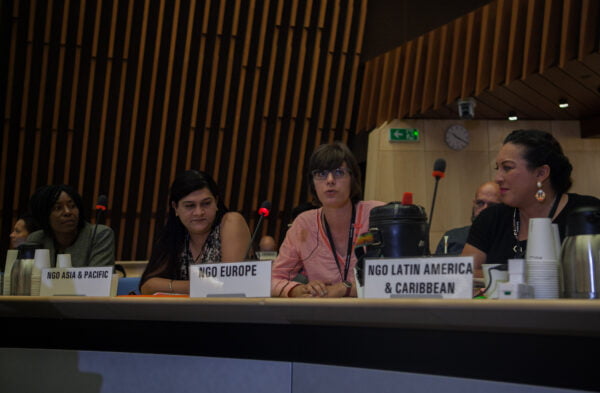Thank you, Chair.
The NGO Delegation appreciates the efforts of the Executive Director in ensuring that critical issues were put on the table at the High-Level Meeting. We appreciate UNAIDS’ role in being present behind the scenes, in the negotiations, and the work that you have put in working with Member States in having at least a very good First Draft.
Coming from New York, we share the frustration and disappointment that our fellow civil society colleagues feel with the Political Declaration; we may have few gains, but at the same time, we have a Declaration that watered down language on comprehensive sexuality education and sexual and reproductive health and rights. We have hoped for a document that will end the AIDS epidemic in a Fast-track approach; silencing key populations and our communities’ voices and issues in the Political Declaration will not Fast Track the response.
We support you, Michel, on your call to fully fund the UBRAF, and we are aligned with you on that. At the same time, we support you in recognizing sexual rights as essential to the response, and as Board members, we have to remind ourselves that guaranteeing sexual rights should neither remain a rhetoric nor a political position. In my region in Asia and the Pacific, these are the realities on the ground: a 14-year old girl is forced to marry an older male relative because she does not have a choice: an exercise of her sexual right. A young pregnant woman who uses drugs fears accessing contraception for fear of being arrested: access to health services that is her sexual right. A young transgender woman who also happens to be a sex worker is killed before her 35th birthday because her client was unable to accept her for who she is: a denial of her sexual right. A young gay man goes in hiding after his family disowns him after he came out: a refusal of his sexual right to live free from fear.
Whenever we deny the existence of sexual rights, we silence someone’s experience and deny his or her right to live free from stigma and discrimination.
I was at the High-Level Meeting in New York few weeks ago and it seems fitting to quote Hon. Tania Dussey-Cavassini, State Secretary for Health and Ambassador for Global Health of the Swiss Confederation who said that the only way to end the AIDS epidemic can only be found outside of our comfort zones.
The next five years is critical in changing the course of the AIDS epidemic. If we continue to turn our backs from accepting these realities, the epidemic will rebound. If the experiences I shared make you uncomfortable, then we have to ask ourselves why these issues keep on coming up; why these realities are being said over and over and over. Sexual rights matters to each of us in the room, but especially to many young people out there, to me, the future of this planet. Thank you.


